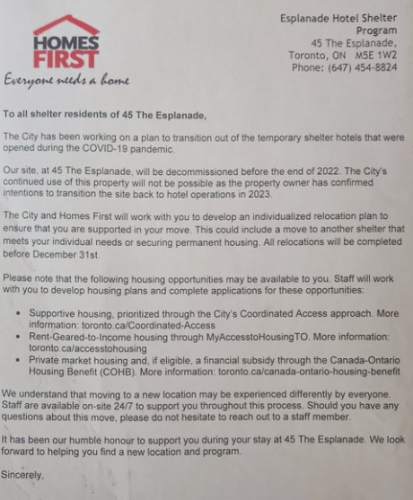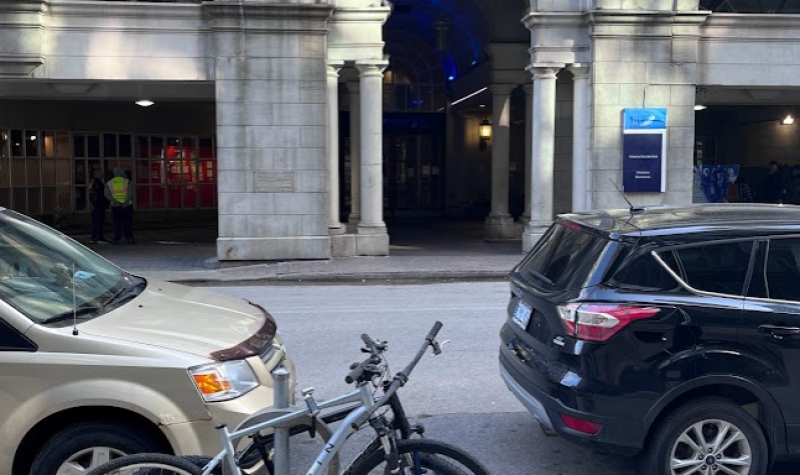This is part one of the series: Decommissioning of the Novotel
On Oct.12, the City of Toronto announced that it will be closing the temporary homeless shelter at the 45 Esplanade by the end of 2022, according to a press release.
The city writes that the owners of the building, the Novotel, want to resume regular hotel operations in 2023.
Temporary shelters were initially established in early 2021 amid a surge in COVID-19 cases and buildings left vacant.
Unoccupied areas like the Novotel were converted into private rooms for individuals experiencing homelessness. New admissions to the hotel were halted on Oct.12 and its closure will affect about 280 unhoused people.

Homes First sent these letters to residents of the Novotel when its decommissioning was announced in October, according to housing advocate Gru. Photo provided by Gru.
"The emergency shelter system plays an important role in supporting the health and wellness of those experiencing homelessness, but its intended purpose is to provide short-term accommodation for people," the press release reads. "The solution to homelessness is permanent housing with supports."
The 45 Esplanade will be the third location to be decommissioned this year. This leaves 25 temporary shelters in Toronto, which are all supposed to be gradually decommissioned by the spring of 2023. To try and fill the void, the city writes that there are future plans to introduce more affordable units and some pathway to permanent housing.
Also, the press release reads that with the city's operating partner, Homes First Society, both will work with residents to develop relocation plans which could include transition to permanent housing or a move to another shelter.
All resident relocations are expected to be completed by Dec.31.
Homes First Society also circulated letters to residents in the hotel. It states that residents may have the opportunities to one of the following:
i) Supportive housing, prioritized through the city’s coordinated access approach
ii) Rent-geared-to-income housing through MyAccessHousingTO
iii) Private market housing - if residents are eligible, they can receive a financial subsidy through the Canada-Ontario Housing Benefit (COHB)
In another letter, Homes First writes relocations will begin immediately to ensure smooth transitions, with the 9th floor receiving notices to begin packing items and be ready to move. Both letters mention that staff will be available on a 24/7 basis.
However, one housing advocate said what is outlined in the letters is inconsistent with what is being communicated to residents by the Novotel staff.
Gru was unhoused since 2014 and has first-hand experience in Toronto’s shelter system and the Novotel. He said the city has been unclear about its relocation plans and how the evicted will be cared for when affordable housing supply and services are almost non-existent.
Further, Gru questions whether the city's intentions for this swift relocation are in good faith, especially as congregate shelters are at capacity and there is a lack of trust in the shelter system.
"It is a really callous approach by the city to say 'we are going to close down these spaces that have been safer,'" he said.
Gru said shelter hotels are half-measures rather than concrete solutions, but are better than thinking congregate shelters are enough.
As COVID-19 cases continue, Gru said there are concerns about contracting long COVID in congregate shelters.

Gru is a housing advocate in Toronto. He was unhoused since 2014 and continues to criticize the city's plans for relocation of Novotel residents. Photo provided by Rafi Aaron.
The city announced in its winter plan to increase the number of beds in each shelter. To accommodate the beds, distancing between them will be reduced from two metres to 1.25 metres.
Without private rooms and social distancing, Gru said the unhoused will continue to be disproportionately affected by COVID.
"Shelters have always been hot beds of disease," he said. "With this virus [COVID-19] in particular, because it spreads so rapidly, there's just no way to get around the fact people are going to get really sick."
With the confusion regarding the relocation plans and where the unhoused will go now, Gru said he believes the city expects them to "go die," especially as tent encampments and sleeping outside during the winter months become the only alternatives with shelter spaces sparse.
CJRU has been in contact with Homes First regarding the 45 Esplanade, however no response was given to multiple requests for comment.
The 2022/2023 Toronto Winter plan was released on Nov.7, and while it did offer plans for more beds and shelter spaces, the decommissioning of temporary shelters will continue and the path to permanent housing for the city's thousands of unhoused remain unclear, according to Gru.
More details to come.
Listen to Part One of Decommissioning the Novotel:


